 Petzlover
PetzloverGrand Anglo-Francais Blanc et Orange is originated from France but Hawaiian Poi Dog is originated from Indonesia. Grand Anglo-Francais Blanc et Orange may grow 32 cm / 13 inches higher than Hawaiian Poi Dog. Grand Anglo-Francais Blanc et Orange may weigh 21 kg / 47 pounds more than Hawaiian Poi Dog. Grand Anglo-Francais Blanc et Orange may live 4 years more than Hawaiian Poi Dog. Grand Anglo-Francais Blanc et Orange may have more litter size than Hawaiian Poi Dog. Both Grand Anglo-Francais Blanc et Orange and Hawaiian Poi Dog requires Low Maintenance.
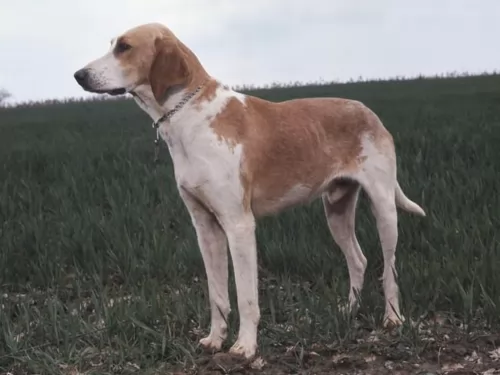 The Grand Anglo-Français Blanc et Orange is one of three Grand Anglo-Français breeds. The dogs comes from crossing French scenting hounds with English Foxhounds way back in the 19th century.
The Grand Anglo-Français Blanc et Orange is one of three Grand Anglo-Français breeds. The dogs comes from crossing French scenting hounds with English Foxhounds way back in the 19th century.
The sporting dog is rare, believing to be be pretty much confined to their country of origin – France. It is recognized in France by the French Kennel Club and also internationally by the Federation Cynologique Internationale. Since 2006, they have been recognized by the UKC and are thought to be kept essentially as a working dog as opposed to being kept as a companion dog.
The Hawaiian Poi Dog was a descendent of the dogs brought to the Islands by the Polynesian. These Polynesian dogs were themselves descendants of the kuri dog of New Zealand. These kuri dogs were originally from Indonesia. The Hawaiian Poi dog is now extinct but at one time was considered the spiritual protector of Hawaiian children and also used as food by hungry Native Hawaiians.
The dog was called poi which was the word for a food staple mad from the root of Taro and used to put weight on the dogs before they were eaten. Meat was not fed to the dogs because it was too scarce. There was no large mammals to hunt and so the breed was never given a standard. The Poi dog seen by European explorers were short legged, pot bellied canines that lived with the hogs in the towns. Because of what they ate, the dogs were not highly intelligent but were stubborn and hard to train. Because the dogs were not suited for much beyond food and a spiritual charm, they became extinct when the traditional religion was no longer practiced and eating dogs was no longer acceptable. The breed pretty much disappeared by the early 20th century. Very few images of the dogs remain except for ancient petroglyphs.
There was an attempt by the Honolulu Zoo in the late 1960’s to redevelop the breed using local dogs to determine a standard. Then the local dogs were bred as close to the standard as possible. In the third generation one dog was born with the traits of a Poi dog. There was not much more success with this and then the Polynesian ship travel between Tahiti and Hawaii was recreated and a dog taken along.
Today’s mixed breed dogs in Hawaii are called Poi dogs but also have the stubbornness, unique appearance and ability to eat anything it is given like the original Poi. The dogs are small, and should not be confused with the original Poi dogs.
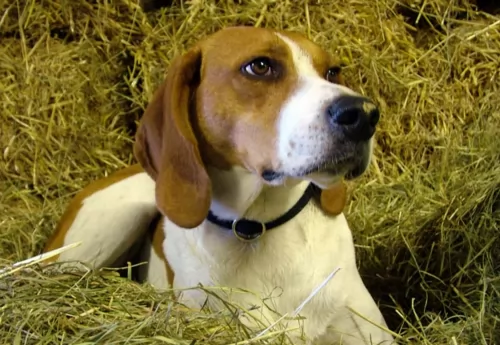 The lean, muscular Grand Anglo-Français Blanc et Orange is a large, powerful dog standing at 60 – 70cm at the withers and weighing 30 to 36 kg.
The lean, muscular Grand Anglo-Français Blanc et Orange is a large, powerful dog standing at 60 – 70cm at the withers and weighing 30 to 36 kg.
He has a short, broad head with a broad, flat skull. He has long legs, a long tail and long, floppy ears. His coat is white with orange markings. These dogs are instinctive hunters with a superb sense of smell and the ability to track their prey for miles.
Sociable, independent, loving and loyal, the Grand Anglo-Français Blanc et Orange can become attached to his owner. He doesn't want to be left alone for long periods of time, becoming bored and destructive.
Training and socialization is excellent for your dog, making him obedient and also more relaxed when you're not there.While he is patient and good with children, if you're looking for a playful pet, this dog wouldn't come as recommended for children, as his heart longs to just be outside on the hunt.
As previously mentioned the Poi dog is somewhat unusual in size and shape due to what they ate. They looked somewhat like the native dogs of Polynesia and New Zealand. They have short legs, long bodies, somewhat obese and a very flat head. He had a short smooth coat, in any color or any pattern. They were however mostly brown and they might or might not have white markings.
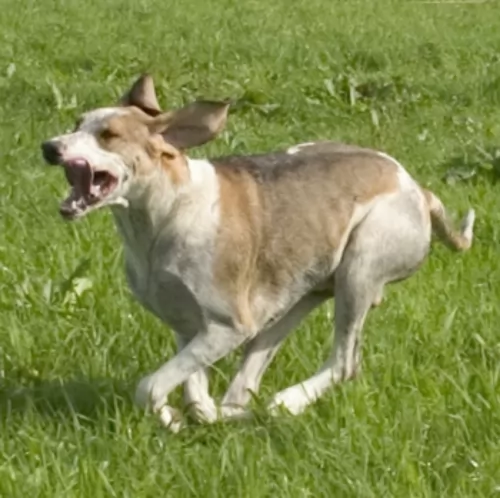 The Grand Anglo – Francais et Orange has always been a pack dog and used to being social. He will get on well with his entire human family as well as with any other pets in the home.
The Grand Anglo – Francais et Orange has always been a pack dog and used to being social. He will get on well with his entire human family as well as with any other pets in the home.
The Grand Anglo-Francais Blanc et Orange is a loyal dog, and when trained he becomes an excellent companion. He is patient with children, but doesn't make a particularly great playmate as he has a more serious personality.
The Grand Anglo-Francais Blanc et Orange is a dog that has been specifically developed to hunt, so ensure that he gets a good amount of exercise. While he is essentially a dog that loves working in a pack, he can still make his human family a loving and devoted pet.
The Hawaiian Poi dog was very friendly and good with children
The Poi was considered a good luck charm and a spiritual protector of children
Given what they faced in life, the Poi dog was very adaptable, living anywhere on the islands and eating anything it could find.
Due to their poor diet, the Hawaiian Poi dog was seriously lacking in intelligence and learning ability.
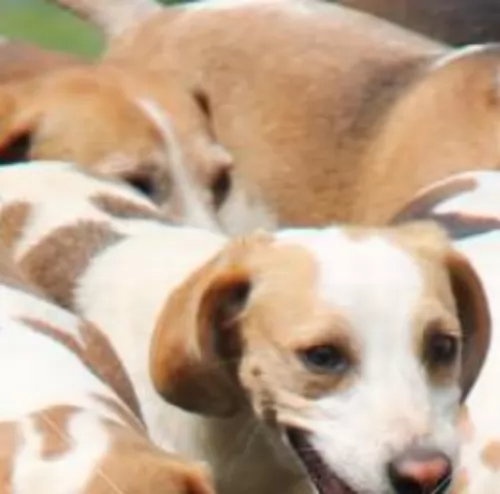 Capable of reaching 10 to 12 years in age, you won't really find any particular health issues with this dog. He is a fairly healthy dog and will be able to reach a good age with good nutrition, exercise, love and care.
Capable of reaching 10 to 12 years in age, you won't really find any particular health issues with this dog. He is a fairly healthy dog and will be able to reach a good age with good nutrition, exercise, love and care.
Because of the long, floppy ears, you want to be checking inside the ears. As a hunting scentdog, he will chase his prey through water if needs be, and damp ears can encourage bacteria.
Ear infections are common in most dogs, and you'll notice your pet scratching and rubbing at his ear and even shaking his head. You may also notice swelling or redness. Veterinary intervention will be necessary.
If your dog's ear infection has cleared up, you can maintain the health of the ear by cleaning them with a gentle cleanser and cotton wool. There is always caution when cleaning a dog’s ear, and rupturing the ear drum is one. Be careful, and if you're not sure, rather make an appointment with your vet to have his ears cleaned.
Probably due to its diet, the Poi dog had several problems to their health. Their poor diet led to a sluggishness both in movement and intelligence. Its development was hampered by a lack of protein. Malnutrition and serious over inbreeding caused a weakness and poor oral hygiene. Due to this lack of teeth and chewing the bones in the dogs heads became flat. The Poi had breathing issues and overall lethargy.
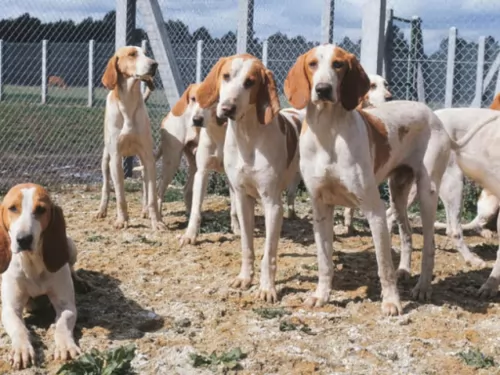 As a scenthound, your Grand Anglo-Français Blanc et Orange loves being outdoors and following a scent trail. These dogs therefore are better suited to life in the countryside as opposed to life in the city. Make sure you provide him with plenty of exercise – walks, swimming and running with you when you go cycling or jogging. Include ball- and rope games too.
As a scenthound, your Grand Anglo-Français Blanc et Orange loves being outdoors and following a scent trail. These dogs therefore are better suited to life in the countryside as opposed to life in the city. Make sure you provide him with plenty of exercise – walks, swimming and running with you when you go cycling or jogging. Include ball- and rope games too.
Your orange and white scent dog will thrive on you taking time out for him to brush his short coat twice a week and to also check for fleas and ticks at the same time.
Looking forward to his food, your energetic Grand Anglo-Français Blanc et Orange will require a high quality commercially manufactured food. Make sure that you buy the best brands to ensure your pet gets his vitamins and minerals in instead of just a lot of fillers, colorants and preservatives.
Many dog owners prefer giving their dogs several smaller meals throughout the day as opposed to one or two large meals. With his dry kibble you can add in some raw meat from time to time as well as cooked brown rice, cooked chicken and vegetables. See that he has access to a constant supply of fresh, cool water.
With meat being rare in Hawaii, none was available for the dogs. They were fed Poi – from the Taro plant roots. Puppies were fed 2-3 times a day.
The adult dog was fed once or twice a day the same as Poi puppies were fed.
The Hawaiian Poi dog basically has not good health points.
The Poi dog did not need and did not get much exercise, leading to its demise.